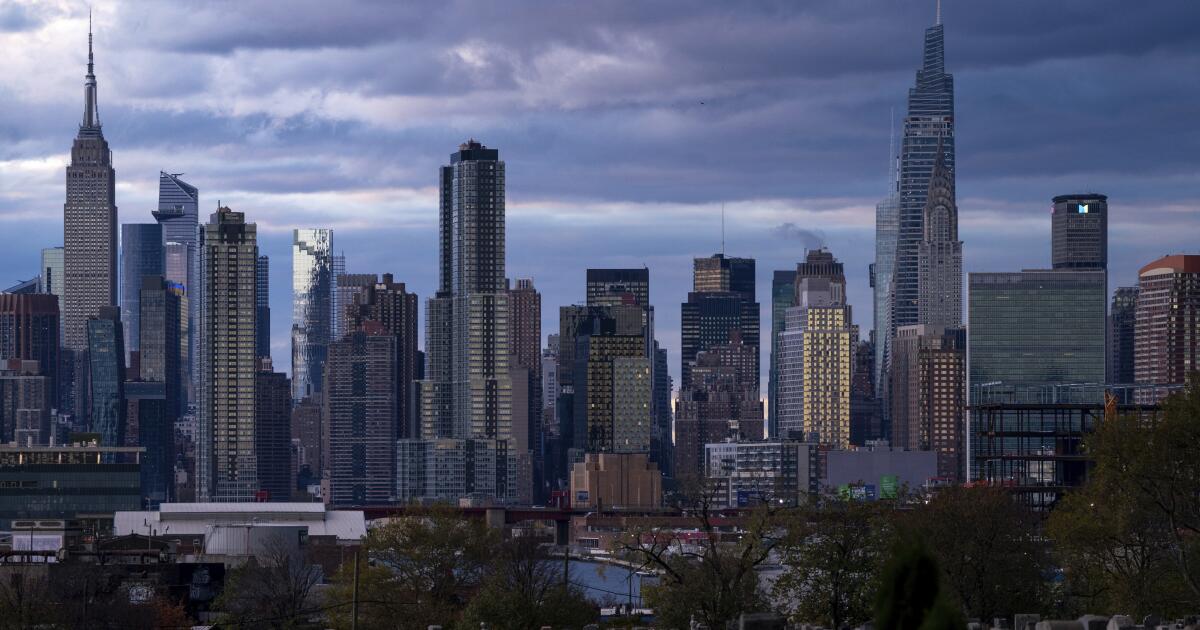The Supreme Court on Tuesday turned down a major property-rights challenge to rent control laws in New York City and elsewhere that give tenants a right to stay for many years in an apartment with a below-market cost.
A group of New York landlords had sued, contending the combination of rent regulation and long-term occupancy violated the Constitution’s ban on the taking of private property for public use.
The justices had considered the appeal since late September. Only Justice Clarence Thomas issued a partial dissent.
Bypass the paywall: https://archive.ph/a9Uu8
Unpopular opinion of the day : I think the justice needed to hear this case.
Given how rapacious landlords have been for all of history, I’d be curious to hear your reasoning.
Tenants are no better, and so there needs to be a balance. We need both landlord and tenant rights. They are in conflict, but the world needs both (remember that public housing just makes government the landlord)
Landlords are wealth leeches.
Tenets breaking rules and being shitty mean that landlords lose on their investments (which inherently carry risk).
Landlords breaking rules and being shitty means that people go homeless, live in awful conditions, or cannot afford basic necessities.
Sure, both sides have the capacity to be bad, but trying to “both sides” basic shelter is fucking wild.
Tenants breaking rules drives up the cost of rent for the good ones. When a landlord expects to have expensive maintenance (patching holes…) that gets priced into the cost of rent. If supply and demand doesn’t allow getting that much rent then they will sell and then no more landlords at all. Renting a house is the best option for some people, so we need landlords. Therefore we need them to make a small profit.
For whom is renting the best option?
Anyone who isn’t going to live there for very long - there are a lot of costs to selling a house, while renters can just move out at the end of their lease. Some of this is risk management - house values sometimes go down, eventually they tend to go up (hopefully tracking inflation long term - often more but I agree with those who say this is not sustainable). The real gains of owning a house don’t come until you have been there for a few years: your payment stays the same while inflation means you get more income (eventually many pay it off) ; and you can reconfigure it to fit your personal needs. A good rule of thumb is if you won’t live there for 7 years you should rent.
If you are good with tools you can save a lot of money doing your own labor - fixing your house can be a good hobby for some. However if that doesn’t describe you then renters mean someone else deals with all the contractors to repair things which can be nice.
In the end everyone has a different situation so there is no common rule. You need to figure out what is right for your situation (some of which is only a guess!) and trust that others figured right for theirs despite coming up with different answers.
Balance is always good but the balance is way farther towards tenants than where we are now.
To get an answer as to whether or not the actions of the city are constitutional.
Not every case has enough legal merit for the Supreme Court. Given that they declined the case, the obvious signal is that it’s allowed.
This is good. Rent control is a local issue and I don’t see a need to involve the federal government.
Yeah I disagree with the idea that it is allowed just because they didn’t take the case. They are just saying this particular case doesn’t meet the standards they need. One doesn’t equal the other
The supreme court only takes a few cases every year. When they turn a case down that is meaningless - they can take it again in the future or not. When they take one that is a signal, but they might not take this one only because they think they have enough else to do [and so won’t have time to do it justice].
Have you heard of “amendments”?
Yes. What about them?
To shoot it down and form precedent.
form precedent
That’s a big ask from the same scotus that shot down a 50 year precedent.
No you definitely don’t want the SCOTUS touching this until after Thomas and Alito die.
Controversial opinion, but shouldn’t capitalism allow the free market to decide rental rates and tenancy durations? Why are rental incomes regulated. I completely understand having regulations for health and safety reasons (maintenance needs to be enforced, apartments need to be liveable) but why control the prices in a capitalist society?
If landlords collectively agree to double the rent of every apartment in a city, tenants can’t simply move to a cheaper unit. There should be someone telling those landlords no.
But that’s the free market at work. Prices will continue to rise until they become unaffordable and landlords have empty properties. Where I live there is no rent control, and the prices keep rising as the economy and inflation rises. When rental properties are in high demand, rental prices increase across the board. When construction provides many new properties to buy, people buy, rental demand decreases, and rental prices stagnate. No need for regulation from some government body. I thought this was capitalism 101?
No that’s an oligopoly, not capitalism. Why are you arguing against your own best interests?
until they become unaffordable and landlords have empty properties
That is precisely what is happening, by design, and it sucks. Wouldn’t it be much, much better if there was a safeguard to prevent this?
When a handful of colluding parties control the entire supply of something people can’t live without, that’s not a free market. It’s despotism. The parties in control can do anything they want, and anybody who tries to tell them no can be deprived of that resource and left to die.
Free market doesn’t mean that all rules go out the window. Colluding over prices eliminates the natural competition that occurs in a free market. That is why it is generally prohibited, though businesses still try it from time to time and they (rightly) get in trouble for it.
They do it all the time and mostly get away with it…
FTFY
The free market cannot provide affordable housing for everything, including essential service workers
I thought pure capitalism meant that a removal of controls and regulations would lead to natural consequences (like essential services workers being priced out) which would eventually lead to a lack of essential workers, which would eventually lead to the creation of affordable accommodation in the city by some enterprising business looking to capitalise on that opportunity. The free market would eventually take care of the problem. It might be disruptive in the short term, but ultimately that problem would be self resolved by the market. Bringing in regulations and controls starts to smell like socialism?!
In a world with infinite resources maybe. But consider places like NYC where there is no more land to build on and agencies with money gobble up whatever land/buildings become available before an enterprising agency can come in to shake up the market and you’ll start to realize one of the major failings of capitalism.
Capitalism always favors the rich at the expense of the poor. The only way that the poor can prosper is at the good will of the rich, which is something that exists in such small quantities that it may as well not exist at all.
Correct
For clarity, I believe in socialism, and live in Australia, arguably one of the more successful social democracies. I’m trying to highlight how capitalism has some massive gaps when it comes to implementation.
Interestingly, in Australia we have no rental controls, and the market just works. Prices rise and fall based on the demands of the market. At times, renting in Australia becomes unaffordable for many, and it’s all over the news, and people try to address the issue. But I don’t know that I’ve ever heard rental price controls being offered as a solution. The more common proposed solutions are to: build more affordable houses in newly created suburbs further from the city, increase public transport options to the city making outlying suburbs more viable, all of which provide downward pressure on the rental prices in the popular city districts. As construction booms, the rental market softens.
(I copy/pasted this comment from its original location as the person I replied to deleted their comment)
Your minimum wage is $23.23 USD/hour. Ours is $7.25/hour.
You don’t have rent control but you DO have a government that drives wages with regular review and increases determined by the FWC. Our wages have practically stagnated for 30 years. It’s been 15 since we last saw a minimum wage increase.
You really can’t compare Australia’s housing situation to the US’s because of the massive economic differences.
But consider places like NYC where there is no more land to build on…
Then NYC needs to manage itself better by purchasing property and knocking shit down to build larger buildings with more tenements in the same footprint. That “flavorful” 2 story with 12 apartments in Manhattan? Bulldoze that clunker and build a new 20 story with 120 apartments in it!
Then you keep doing it. NYC buys property, knocks down whatever tiny thing is there and rebuilds it to 10 or 20 times the previous capacity. Lather, Rinse, Repeat.
All that’s happening with their current scheme is that the rent controlled apartments are being subsidized by everyone who lives in the market rate apartments so that they don’t damage the “character” of certain areas. The only winners are the people in the relatively few available rent controlled apartments and they’re only winning because they’re literally taking money from other people.
It’s not sustainable.
That’s a myth, that hypothetical never happens in pratice. Why should I trust you over reality?
it might be disruotive in the short term
This handwave sentence is always what libertarians use to hide the utter destruction of a working society.
“Yes, millions of people in a city suddenly being homeless, leading to crime/violence/mass death/the breakdown of all services and commerce would be disrupted, but at some point after tens of thousand die it would work itself out because…”
Plenty of “libertarian paradises” out there man, only some of them over run by bears. Hows that track record of unfettered capitalism going?
In my opinion, basic human rights such as adequate housing shouldn’t be left solely to the free market. That’s just asking for human rights violations.
That said I’m kinda of disappointed in how black and white this issue is usually dealt with on lemmy (I get the feeling most users have the opinion: capitalism equals evil)
In my ideal society, we as a society would facilitate basic housing for people where needed. Everything above the basic necessity of a roof above your head and a place for yourself (adequate housing), I think can be left up to the free market. I think the prices of the free market would be more ‘proportional’ if the free market knows they can’t ask ludicrous prices if there’s basic housing as a safety net.
but why control the prices in a capitalist society?
Yeah, why would we want to regulate prices on a necessity to live that requires capital to be able to own, thereby meaning that ownership will only ever be in the hands of a small amount of lords that the peasants are 100% at the whims of the owning class. Add in that it’s better for landlords to collude and drive up prices (to the point that the rental price increases can be entirely automated to better extract money from renters) it’s not difficult at all to see why it needs to be regulated.
It’s very disruptive when people are forced to move due to rent increases. Rent control helps smooth over the effects of cyclic changes in the rent market on individual people.
… violated the Constitution’s ban on taking of private property for public use.
Do they think that regulating the usage of private property is the same as having it taken away? Was their argument really “As long as it’s on my property, I should be able to do whatever I want, whenever I want, to whomever I want. Anything else is a violation of my rights!”
Property can be “taken” by the government, this sometimes happens when zoning laws change. For instance, if the zoning of the property was changed from residential to agricultural for example. Then the owner could argue that the value of the property was “taken” by by the government and they would likely win the case. Regardless of if the owner was a landlord or the owner of a vacant lot.
To be clear, I’m not commenting on the original issue, but intend to only provide information about the laws related to this issue.
The argument is that there exists some level of regulation by the government at which point you can claim that you functionally do not have ownership of the thing in question.
That bar is definitely very high - consider landmark laws where you can be legally forced to maintain certain aesthetics or can be prevented from knocking down a money pit that you also functionally can’t sell - hence this case failing, but it’s not an absolutely absurd argument in general principle.
Regulating can be a violation of the Takings Clause. It just isn’t here.














